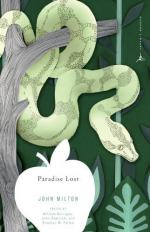|
This section contains 2,156 words (approx. 6 pages at 400 words per page) |

|
In the following essay, Innes-Parker studies Milton's struggle to reconcile the sinful nature of humankind with the inherent value of knowledge, assessing Adam and Eve's sin which results from eating from the Tree of Knowledge,
Paradise Lost has been hailed as one of the greatest poems in the English language. While this acclaim is due in a large part to Milton's command of language and poetic style, much of the attraction of the poem lies in its content. The discussion of temptation and fall is rooted in universal questions concerning the nature of good and evil, the apparent injustice of a world where the wicked prosper and the good suffer, the nature and value of knowledge, and the nature of humankind.
Milton's struggle to reconcile the Genesis account of the Fall with his own deepest convictions and concerns is often attributed to a failure to come to...
|
This section contains 2,156 words (approx. 6 pages at 400 words per page) |

|




